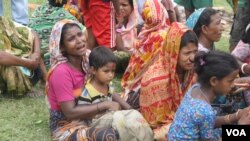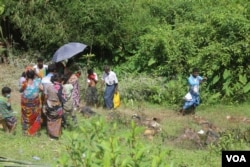Amnesty International is blaming armed Muslim Rohingya insurgents for massacring nearly 100 Hindus in Myanmar last year, at the same time Burmese security forces began their brutal assault on Rohingya civilians.
The new Amnesty report is based on what the group calls "a careful review of evidence," including testimony by witnesses, survivors and forensic pathologists.
"It is hard to ignore the sheer brutality of ARSA's [Arakan Rohingya Salvation Army] actions, which have left an indelible impression on the survivors we've spoken to. Accountability for these atrocities is every bit as critical as it is for the crimes against humanity carried out by Myanmar's security forces in northern Rakhine state," the report says.
Amnesty charges the Rohingya with using guns and swords against up to 99 Hindu men, women and children during at least one and perhaps two massacres in and near the village of Ah Nauk Kha Maung Seik.
Some women say they were spared only because they and their children agreed to convert to Islam.
Other victims were robbed before they were blindfolded, marched away and executed.
The reason for the alleged slayings was unclear, and no one from the Rohingya community has commented on the Amnesty report.
The alleged Hindu massacre came at the same time the Burmese military launched a brutal crackdown on Rohingya civilians after Rohingya militants attacked police posts and an army base in Rakhine state.
About 700,000 Rohingya refugees fled into neighboring Bangladesh, and many are still too terrified to return home.
Myanmar's Rohingya minority say they have suffered decades of discrimination by the Buddhist majority. They are denied citizenship, access to jobs and educational opportunities.
Tirana Hassan, Amnesty crisis response director, says there is no excuse for homicide, brutality or discrimination against anyone by anyone.
"ARSA's appalling attacks were followed by the Myanmar military's ethnic cleansing campaign against the Rohingya population as a whole. Both must be condemned. Human rights violations or abuses by one side never justify abuses or violations by the other," Hassan said.
Hassan said all the survivors and the victims' families have the right to justice, truth and reparations.

